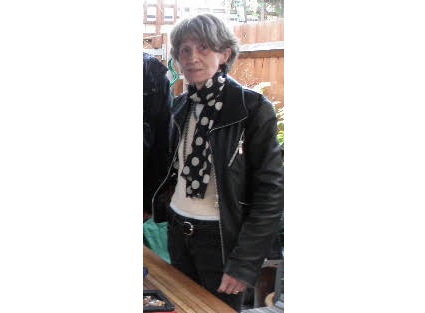From friend and ex-FT colleague David Lennon:
Celia Hampton, our stalwart anchor in the AEJ UK Section for so many years, died on May 17 after a protracted battle with the pulmonary illness which had dogged so much of her life in recent years. Her funeral took place in London on May 31.
Celia was forthright and scrupulously honest both as a journalist and as a most valuable member of the AEJ. She wrote widely on competition, financial and legal issues for many publications over a long and distinguished journalistic career.
Celia has been a very dear friend and colleague to many of us for a long time. She was always modest about her achievements but was extremely knowledgeable about legal matters, and continued to write regularly for Competition Law Insight despite her increasing frailty and ill health.
She did an enormous amount for the AEJ, as the UK Section’s Secretary and Treasurer for many years, and the founding, indefatigable editor of the Section’s website.
Whenever the Section needed someone to hold the fort, it was Celia who agreed to help. In 1999 Celia stepped in to be Acting Chairman and in 2001 agreed to be Treasurer for several years. She took on the key role of Secretary between 2006 and 2010, when she handed that baton over to Margaret Hughes.
It was also in 2001 that she devised and launched the section’s own website www.aej-uk.org and she continued to develop and look after our website for the next 15 years, determinedly posting material with wonderful efficiency and conscientiousness right to the end.
She will be hugely missed by all her friends.
William Horsley, Chairman of the Section, says that Celia combined her unique wry humour with great resourcefulness and moral integrity which won her many friends and admirers. She also had a great many friends around Europe in other AEJ sections, and helped the association to navigate through every squall that it has confronted, including the tortuous process of revising the international AEJ’s Statutes several years ago.
Peter Kramer, former AEJ Secretary General (2004-12), wrote from Brussels:
Celia will be hugely missed by me and others who became firm friends with her through her splendid work in and for the international AEJ, as well as for the UK Section.
She and I first met in 2004 at the AEJ International General Assembly in Kosice, Hungary. That meeting was the first after a crisis in the AEJ due to serious organisational strains. A new board was elected, in which Celia became Vice President and I became the new Secretary General.
’Kosice’ was the beginning of the resurgence of the AEJ, on which she and I worked for many years together with other colleagues. Celia’s strength, steely intellect and keen legal mind played a crucial role.
After she stood down as Vice President in 2008, she stayed active as the invaluable legal advisor to the AEJ. Despite her inability to travel because of her failing health, the communication and cooperation was always seamless.
In order to make the AEJ a more modern and incisive organisation it was decided to make significant changes to the structure and statutes of the association. Celia became a tower of strength, shaping, guiding and challenging to meet our agreed goals, and in the end we overcame all the hurdles. During this process she was straightforward, very calm under pressure, and had a wonderful sense of humour. Finally, at the AEJ General Assembly in Brussels in November 2013, the new statutes were approved.
Celia and I met a few months later for a celebratory lunch together in London. We talked about putting the world (and the AEJ!) to rights. This turned out to be the last time we met personally.
I will always remember Celia as a good friend, a great colleague and altogether a rather wonderful person.
Celia’s son Adam Hampton provided this resumé of his mother’s career:
At about the age of 18 she studied for the bar and by the end of the 1960s she became a barrister.
She never took to being a barrister like her ex-husband, Paul, did and started doing other jobs. These ranged from marking surveyors’ exams to editing the solicitor’s journal and the journal for the Legal Executives.
In the 1970s she met and started working for Adolf “Andy” Hermann, the FT legal editor, as well as editing the International Comparative Law quarterly and a Business Law newsletter for the British Institute of Comparative Law.
Through the 1980s she continued working for the British Institute and also started editing an FT newsletter called the Business Law Brief which turned into Business Law Europe in the early 1990s.
Also in the early 1990s when the Berlin wall came down she launched a companion newsletter called the Eastern Europe Business Law Brief.
She was one of the first editors to both edit and typeset her publications for FT Newsletters and her innovation meant she was able to charge for both jobs when she started using a computer to do the typesetting. Amongst her peers this was very rare.
When FT newsletters was closed down by Pearson in the late 1990s she looked into other innovations and with Peter Thompson tried to bring resources together for those involved in business law. After this project she teamed up with a database expert and launched PublicInfo, an innovative way of searching cases and legal resources without the need to employ enormous teams of people to do the job.
She went back into journalism and in 2002 she launched and edited Competition Law Insight, a journal dedicated to Competition Law, and was still contributing articles this year.
Max Findlay, the Editor of Competition Law Insight (CLI), writes:
Celia handed over the editorship to me in June 2005. After that she regularly contributed the front-page leader for CLI and its electronic sister, CLI in Brief.
Her last leader – on Google and the problems that the online world poses for competition law – appeared in the 26 April 2016 edition of CLI in Brief. I knew Celia for something like 30 years.
At one level, I knew a lot about her. She was clever and could articulate her views very clearly, using an extremely wide (and sometimes delightfully archaic) vocabulary.
She was a great teacher. When I started editing CLI and ignorant about many things in the competition law world, Celia would explain them in readily understandable terms without ever talking down to me. She was excellent company. And I realise from talking to other people that she had a wonderful knack of keeping her friends over decades.
When discussing ideas, concepts or news developments, she was often passionate but always rational. Certain things, though, really got under her skin.
Condescending lawyers and self-regarding graduates of the older universities were a particular bugbear.
New computers with idiosyncratic features were another, although something in her rather liked the challenge of conquering them.
And then there were the sympathetic expressions (usually prefaced by the immortal phrase “Gee Whizz”) of shared annoyance over the minor inconveniences of life.
My strongest memory of Celia is of drinking coffee with her in the early morning outside a café in Strasbourg next to the city’s medieval red-stone cathedral. She was dressed mainly in black with a coloured scarf round her neck, smoking the inevitable cigarette – a roll-up, from memory – and holding forth in strong but civilised terms about some iniquity in that morning’s news.
There was something timelessly rive gauche about the whole thing. You just needed a bunch of bohemian intellectuals to come round the corner and complete the picture.
Former AEJ Secretary Kevin d’Arcy recalls Celia as one of the world’s most excellent but also most reticent of journalists.
Her loyalty to her friends, of which I was one, was fierce in its application. Fellow workers at the FT certainly remember her admiration for Andy Herman the FT Legal Editor and his similar insistence on precise accuracy in all matters.
Celia was one of many legal scribes who accepted an invitation to join members of the AEJ at a lunch with the Lord Chancellor of the day, which was when she immediately made her mark in asking the most deft but pertinent questions. From that day on she seldom missed a meeting.
She also became a valuable member of the Association of British Editors. Many worthwhile and well-paid positions were advertised over the years for which she would have been admirably suited, but her overwhelming modesty held her back.
Kate Clifton, Managing Editor of Informa Law, publishers of CLI:
Celia has never missed a deadline with us. However, she often forgot to submit her invoices so that we could actually pay her for her hard work.
It’s something that she and I joked about in the past and I found it amusing as I usually have to chase people for copy, not invoices. Celia was of the school of thought – and not many remain – that the content was the most important thing. She wrote because she loved to, and that really came across in her pieces.








